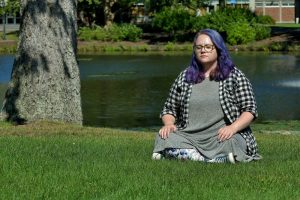Alumni sessions focus on self-care, wellness

Speakers shared tips for better health during pandemic year
For many, maintaining mental and physical well-being was especially difficult during the pandemic.
Luckily, alumni in the fields of health and wellness were invited to help. This academic year, many presented their knowledge and insight at virtual talks devoted to the topics of wellness and self-care.
Sessions covered the many dimensions of optimizing mental and physical health, including the relationship between food and well-being, stress management, meditation and the daily benefits of weight training.

A number of these online talks were part of the Alumni Relations Office’s winter series of wellness events. As part of this initiative, Caleigh Grogan ’18—Wheaton’s interfaith engagement coordinator—led twice-weekly meditation sessions throughout the spring semester.
Early during the academic year, in October 2020, the Marshall Center for Intercultural Learning hosted the event “Stress Management from the Lens of Four Modern-Day Professionals of Color.”
Alumni featured included Luis Baez ’05, a business strategist, trainer and entrepreneur; Orly Clerge ’05, assistant professor of sociology at University of California, Davis; Marlon Ramdehal ’04, regional director of program at Year Up; and Jessica Arrendol Kiely ’05, health and wellness educator, strategist and coach and CEO/founder of Wellness Literacy, a health-focused company.
During the talk, they discussed their time at Wheaton, tools and strategies for managing stress as leaders and entrepreneurs, and how they are able to stay committed to social justice without burnout.
Kiely said it was great sharing their experiences directly with Wheaton students. She encouraged them to take time to learn healthy coping mechanisms before graduating college.
“Students can prioritize their health by making sure that they seek the support of a therapist before they get to a place of crisis. Establishing that relationship before you get to a place where you are overwhelmed will help you have someone who can support you and either provide you with the tools to get through that period or connect you to another resource that can help. Mental health cannot be something that we react to, but rather needs to be something to prepare for,” said Kiely, who majored in Hispanic studies at Wheaton and received her Ph.D. in urban education, leadership and policy studies from the University of Massachusetts, Boston.
Kiely also participated in the talk “How to Promote Health Immunity and Mental Health Through Food” in February. She co-led the talk with Naihomy Jerez ’08, a Hispanic studies major.

A food guidance and lifestyle coach, Jerez is the owner of Bagels and Brussels, a wellness consultancy. She chose to participate in the workshop to help students manage the added layers of anxiety, depression, disordered eating and lack of natural movement during the past year.
To feel best, she encouraged students to limit processed foods and added sugars and to incorporate movement and activities that calm the mind and bring joy.
“Many people understand that food plays a big role in staying healthy in general or for weight purposes, however many do not know how impactful food is to maintain our immunity and mental health. My goal, along with Jessica’s, was to bring awareness and share tips on what kinds of foods can also help support our immunity and mental health as we ride out the pandemic and, really, for whenever life hits again,” she said.
Also, in February, Zoe Hack Keller ’05, a holistic health coach and medicinal herbalist, presented “Natural Solutions for Stress Management.” Her presentation explored how to use food, medicinal herbs and lifestyle strategies to effectively support the nervous system and reduce stress.
Her best tip for preventing stress? Be thoughtful about finding a form of self-care that allows you to disconnect and feel replenished.
“It’s so easy to live in ‘go, go, go’ mode all the time, but unfortunately that’s what causes burnout. Self-care looks different for everyone. Some people like taking a walk, relaxing in a bath, doing 10 pushups, reading for fun, listening to a guided meditation or making a cup of tea. The point is to find the self-care that works for you, not to follow industry trends or force yourself to do what others are doing. When you find your personal high-value self-care strategies, it’s easier to make time for them and really integrate them into your life,” said Keller, who majored in sociology.
Jon Shephard ’10, a certified strength and conditioning specialist and certified functional strength coach, gave the talk “Strength Training and the Benefits in Everyday Life,” in February. The virtual workshop walked participants through a typical four-week weight training program and how it can be structured to accommodate the fitness goals of anyone, at any level.
His biggest tip for promoting well-being is to simply stay active, get outside and avoid stress at all costs.
“Being continuously active is great for the body and mental well-being. We only have one body, and we should take care of it,” said Shepard, who majored in sociology.